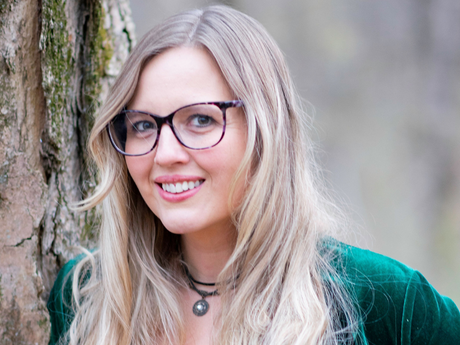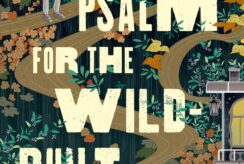By Karlie Shoffner
Poet Sara Moore Wagner will be reading some of her work at BGSU on Thursday, March 23. She has written two poetry collections, Swan Wife and Hillbilly Madonna, as well as two chapbooks, Tumbling After and Hooked Through. Her work has appeared in numerous anthologies and journals and has been nominated for several awards including a Pushcart Prize and Best New Poet. Wagner is also a BGSU alum and earned her BFA in creative writing here. Following is an interview with the poet to better understand her relationship with writing and the writing journey she has gone through.

Q: How did you start writing?
A: I started writing really young, maybe as soon as I could write. I remember my first journals were in rhyming poetry. The form of poetry felt very natural to me. As someone who wasn’t particularly gifted at drawing, language was my art medium—it was how I got through boredom and how I chose to express myself. As a child of divorce, I could also take my writing with me between houses, so I was never lonely! I’d write stories and plays when I was little too, organizing the neighborhood kids into big performances.
Q: How did you discover your love for poetry?
A: I think I always loved sound and beautiful words. I remember reading poems, older poets like Edna St. Vincent Millay, in books my mom had, and in the library. In middle school I discovered the music of Tori Amos, which felt like poetry to me in a way I hadn’t experienced before. She is so odd and lyric and fractured, and that made me expand and experiment more than I had. It also made me seek out more poetry on my own, where I found Sylvia Plath and HD’s Trilogy, which fell apart from my reading it so many times.
Q: How did you come to focus on poetry versus other genres?
A: I went to a religious high school, so I found I had to say a lot of what I was thinking in code, which helped me develop my sense of lyric and metaphor even more. Sound in my writing was just natural. And, though I have moved away from strict rhymes, I still use a lot of rhyme in my work. I was drawn to the genre first in books and music, basically, and then I discovered I was best at poems—they felt most natural to me. I will say the teachers there did help me understand I had a gift for poetry, which led me to majoring in it in undergrad. I always say poetry is the only thing I’ve ever been good at! It’s consistently been the only thing I want for my life, as far as dreams go.
Q: What inspires you?
A: Lately it’s been art, particularly religious art and artifacts, historical representations of Jesus. I go through little obsessions. I recently finished a book of poems on Annie Oakley, so for a while there anything related to her or her life would spark a poem. Fairy tales and myth always get me going, and often science. I am very inspired by other genres. I have friends who find a lot of inspiration in reading poems. I think I learn more craft things there, but my larger poem ideas come from other kinds of text. I am also inspired by my children and my past, by my family—anything that sparks my curiosity or wonder (or anxiety, often!).
Q: Who are your favorite poets? Why?
A: I have always loved HD for her mysticism and her images. I consider myself a poet who is focused on image, and she is the one who first brought me to that. Other poets who shaped me are Sharon Olds, Anne Carson, Adrienne Rich, Anne Sexton, Lucille Clifton, and Sylvia Plath—all of whom were poetic mothers to me, showing me different things I was “allowed” to do in a poem. Many of them use myth and fairy tale in ways that introduced me to that, in ways I hope I build on.
Poets who were/are actual mothers, like Clifton and Olds (and more recently Nancy Reddy and Maggie Smith), also inspire me to fight for my art. I once went to a Sharon Olds lecture and asked her how she made time as a mom, and she looked me in my eyes and basically said “you have a gift. Fight for it.” These women who fought through societal expectations to carve a space for their own lives and words—I carry them with me every moment I take away from my children to do this poetry thing.
There are also poets who I read every book in awe of their ability to craft language the way they do. Those poets, for me, are Diane Seuss, Ada Limon, and Nickole Brown (off the top of my head!). Consistently, every book is life changing. My list of books I love is long, though. I find something to love in every book I read. Poets are amazing.
Q: What is your favorite part of writing? Why?
A: I love the catharsis that comes when you get something just right. Usually, when I write, I put my poem away for at least a month. My favorite part is when I open a file and find a little magic there—when I know just what to do to make it perfect—and it works! This does not happen all the time, but when it does, it’s magic.
Q: How do you overcome obstacles when you’re writing?
A: Usually, I will put that poem away. If I hit a wall, I figure that wall is there for a reason. With time, maybe it will go away. I don’t expect to figure everything out at once, basically. The main obstacle I face is not having time for my writing. I overcome that with scheduling. Sometimes, I need to get up earlier. Sometimes I need to take a weekend away. Making time and forcing yourself to do the work goes a really long way. The other obstacle every writer faces is rejection. If I get a lot of rejection, instead of feeling defeated, I read more to improve my own craft. I tell myself I can always get better.
Q: What has been the proudest moment in your writing journey? What about the most difficult moment?
A: I’ll start with the most difficult. When I finished undergrad at BGSU, I was an absolute mess. Outside of the environment of the workshop, without deadlines or goals, I quit writing. I did not write for seven years, choosing to party and forget myself instead. This weighed on me through those years, but I would do whatever I needed to make myself feel better and forget.
Then, I got pregnant with my oldest child. This pregnancy made me really change my life and my trajectory. Eventually, I went to grad school as a single mom—at that point, I just thought I would teach literature, I didn’t think I was a poet anymore, but an amazing professor saw my talent and told me I needed to follow that gift.
Which leads me to what I am most proud of: I am proud of myself for not giving up. I put myself back on that path. I have achieved many things I set out to, but I would never have done it if younger me had not said wait—this is important. I am doing this.
Q: What is your favorite poem that you’ve written? Why?
A: I am so proud of any poem that’s made it to publication, but just recently I placed a heroic crown of sonnets in Still. This poem was, years ago, a finalist for Iron Horse’s long poem contest, and over the years it got a lot of “we love this, but no”s. I loved this poem for a long time, because of the work that went into it. I crafted and counted syllables, it was a passion project and obsession, and I wasn’t sure anyone would ever get to read it. Now it’s out there, and I’m just delighted. I also used a lot of biblical references in this poem. It’s a call to action politically, against the patriarchy, to save the environment. I am not normally so outwardly political, so I am proud I achieved that, especially in such a difficult form.
I think this answer changes all the time, though. My favorite poem is always the most recent one that works.
Q: What do you want readers to take away from your work?
A: I hope that each reader takes what they might need from it. I hope they also see that I really fight to dispel and challenge stereotypes about women, about Appalachians, about addicts, about mothers. I do this through, often, established forms and tropes. I want to break frames that both reflect and refract identity. I do this through established poem forms, and through rewriting myth and familiar stories and characters. I think there is an instinct to see women’s writing, particularly women who are mothers as lesser, as quaint or precious. I would love for someone who believes these things to read my work and see that there is complexity—and for someone who is worried about speaking to read my work and feel inspired to put themselves on the page.
Q: What advice do you have for young writers?
A: My advice would be to not worship the highs. I have an addictive personality. It’s easy for me to get hooked on the endorphin rush that comes from praise and acceptance, but that is exactly what made me stop writing when that stopped. When I returned to writing, I made a plan for myself. I would keep going, no matter what, for at least 5 years, THEN I would let myself feel down or evaluate. I did what I wanted in those years, focusing on the long game, not the short bursts of pleasure (or pain, in many cases—there is a lot of rejection). Set a goal far out in the future. Don’t expect yourself to be there in a year. That’s not how it works, normally. You’ll get there but give yourself time.
If you are interested in hearing Wagner read her work, she will be on campus at Prout Chapel on Thursday, March 23. Following the reading will be a Q&A session with the poet. To learn more about Wagner, you can visit her website saramoorewagner.com
